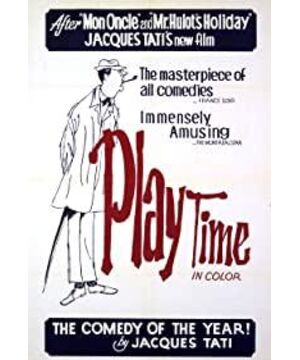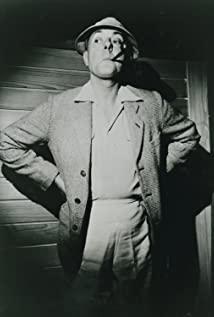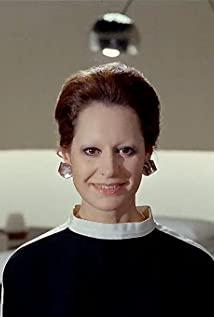The whole film is composed of four main spaces: office buildings, trade fairs, apartments, and restaurants. There are two secondary spaces at the beginning and end, the airport terminal building and the street.
Office building
Mr. Hulot came to work in a building. The tedious procedures, funny hierarchy, and rigid bureaucracy consumed his patience like a bottomless pit. These undoubtedly point to the Kafka-style dilemma. And a lens overlooking the office unit is reminiscent of Foucault's Panopticon prison.
As a last resort, Mr. Hulot can only stray in this glass labyrinth like a headless fly. In order to find Mr. Giffard, he even chased the reflection on the glass door to a building next door. The whole film has also repeatedly used glass reflections to create many ridiculous coincidences and misunderstandings.
The large-scale use of glass is one of the hallmarks of modernist architecture, and a series of complex spatial relationships created by reflections and overlapping shadows-uncertainty of location, confusion between here and there, internal and external Through-reveals a broader existential spiritual crisis, or a harbinger of schizophrenia. People walking freely between the glass curtain walls are like ghostly phantoms, ready to be frightened by themselves or others. This is a state of existence that is both here and there, neither alive nor dead.
Commodity Fair: Unveiling the illusion of globalization
Benjamin once wrote: "The World Exposition is a place of pilgrimage for commodity fetishism."
The modernity of the exposition lies in the fact that such a mechanism for collecting, screening and categorizing commodities must be built on a complete and mature industrial system of capitalist globalization, large-scale production and large-scale circulation. In the process of visiting the exposition, individuals are also obsessed with illusions about their own "world resident" status.
In this passage, visitors watched a series of performance-based sales displays. Special products became magic props in the hands of these salespersons. Such a performance ceremony aimed to promote the products to the altar of fetishism. "Beauty glasses" and "mops with light bulbs" all remind the audience that the essence of consumerism is not to satisfy demand, but to create demand. And this insatiable need is created through the landscape.
Subsequently, the German boss who produced silent automatic doors mistakenly identified Mr. Hulot as a man who was peeking at confidential documents, and every move of that man was in line with Benjamin’s definition of a stroller. He just couldn’t buy it and was intoxicated. To empathize with commodities. He can be anyone (any commodity), and anyone can be him.
When Barbara, an American tourist, looked at the poster at the booking office, the audience desperately found that the national mythology constructed since the pre-modern era has long been reduced to a series of shallow and superficial symbols. The driving force for the development of capitalism comes from such a desire to smooth out all the differences in time and space, and the result/cost is an absolutely homogeneous lifestyle. Absolutely the same travel experience, no maze of export commodities.
In several shots of opening the door, the Eiffel Tower and the Arc de Triomphe, which are reflected from the glass door, are suspended in the air like a mirage. They are a series of ghosts of overhead symbols. They are zero-degree monuments, which do not have any meaning in themselves. They only begin to produce when they are reflected in the eyes of another culture and projected onto a medium of another material.
apartment
This passage uses a lens with Brecht-style alienation to photograph four families.
Mr. Hulot's former comrades used a performance technique to show him modern furniture, just as a salesperson demonstrated beauty glasses and a mop with a light bulb. I think of the extremely boring middle-class life that Godard described at the beginning of "Madman Pierrot". There are only some exaggerated advertising slogans in the dialogue between people.
Every family watched TV. The huge stream of TV programs rolling at this moment seems to create a kind of simultaneity and groupness, but here, the lens emphasizes how the television medium exacerbates the separation between individuals.
A wall separates the hostess of one family from the hostess of the other. The eyes of the two meet in one place, but they are not staring at each other. The TV screen seems to block all the intersection of desires and the communication of emotions. Off. The TV is an opaque screen, a box, and a theater, but while miraculously presenting a distant new world, it also reflects the prying eyes back to the viewer itself like a mirror. A small room and a luminous screen are enough to build Plato's cave, where everyone is addicted to their own reflections.
Street: Order in Disorder
The city itself has become a large playground, and the collision of molecules has brought about a series of wonderful chain reactions. The movement of the limbs when walking, the frequent and tense movement of the sight, and the heat brought by the crowd will bring visual dizziness, and this dizziness is the source of happiness.
Balloons, paper hats, bicycles, cars, umbrellas...As long as you are in the city, you will see the same elements again every once in a while. The so-called new events are just the disorderly arrangement of these limited elements. .
As Blanqui said in "Astral Eternity":
Our replicas are infinite in time and space. In the arena of the earth, the same drama, the same background, and the same small stage are everywhere-noisy human beings are indulged in their own magnificence, believe that they are the universe, live in their own prison but think that they are living. In an infinite world.
View more about Playtime reviews











